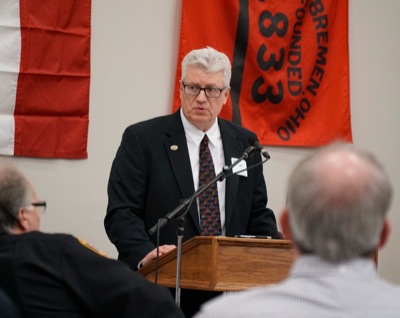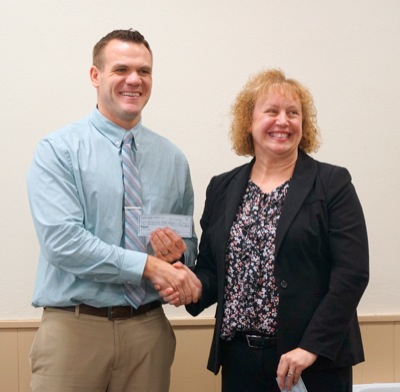Wednesday, January 31st, 2018
Area mayors tout villages' progress
Projects highlighted at meeting
By Sydney Albert

Photo by Sydney Albert/The Daily Standard
New Bremen Mayor Jeff Pape speaks at the annual State of the Villages Breakfast on Tuesday morning, giving a brief update on village projects completed in 2017 and what residents can expect in the coming year.
NEW KNOXVILLE - Minster, New Bremen and New Knoxville village officials and business leaders came together at the annual State of the Villages Breakfast on Tuesday to review last year's achievements and to share what they plan to accomplish in 2018.
Minster Mayor Dennis Kitzmiller said last year was busy for the village in terms of improvement projects, and he sees the coming year being similar in that regard.
"Several projects were completed in 2017 while several more were started that will carry over into 2018," he said. "The village also saw some changes in personnel and a considerable amount of growth in the community."
Crews finished installing a 16-inch water line along State Route 66 in front of the Dannon Co. and have also finished improvements around the concessions stands at Four Seasons Park, a joint effort among the school, village and athletic boosters. The village also handled minor street resurfacing, which Kitzmiller said cost $300,000.
Four parcels of ground were annexed into the village last year, and the town grew by 57 acres.
Looking to the coming year, Kitzmiller reported the village recently awarded a bid to Beaverdam Contracting for a $1.2 million project involving a complete reconstruction of Fifth Street. Village officials also plan to renovate the north electrical substation, which is about 50 years old, in 2018.
He said residents will also "see the start of the second phase of the village solar and energy storage project. This will involve the construction of another 4.2-megawatt solar field and a 7-megawatt energy storage (facility) near the solar field. The construction of this stage will once again enable the village to save on transmission and capacity costs."
Finally, Kitzmiller reported that more than $3.7 million in income tax revenue had been collected by the village last year. Minster also has joined 130 other Ohio municipalities to challenge the constitutionality of the new Ohio tax law granting the state the power to collect local taxes and charge a fee. Village officials plan to continue with the challenge.
"The village feels strongly that this new law is clearly a violation of the home rule powers granted to the community by the state and hopes to have the new law overturned," Kitzmiller said.
New Bremen mayor Jeff Pape reported that income tax collections had declined somewhat in 2017, though he believed it to be due to the adjustment from the village's going from a quarterly receipt to a monthly receipt rather than businesses performing poorly. The village collected about $4 million in income taxes, down roughly 5 percent from the previous year's.
"That's still pretty darn good for a town our size, and we're still pretty healthy," he said.
In terms of infrastructure, the village recently completed a new public works building and an EMS/police building. Pape said New Bremen also had received a $240,000 grant from the Ohio Public Works Commission and matched it with $187,000 to upgrade village streets. Another OPWC grant for $500,000 and a $500,000 zero-interest loan were recently secured and will be used for a "much-needed" upgrade of all of Eastmoor Drive and Front Street that would start in the spring.
Laser traffic-detection devices have been added at the intersections of Plum and Washington streets and Monroe and Main streets to help with traffic flow.
Looking to the future, Pape said village officials hope to have a new four-legged officer in April. Village council approved the purchase of a K-9 for $80,000, and the dog will be trained for drug enforcement and the ability to track lost individuals. Pape said he didn't think New Bremen had a large drug problem, but having a K-9 could help assure that remains the case, and it could also be used in mutual-aid runs to neighboring communities.
"We were lucky enough to receive donations of over $60,000 to cover that cost. Officer Justin Bruns will soon be leaving to meet his dog and receive the necessary training," Pape said.
State Rep. Keith Faber, R-Celina, also spoke. He went over state tax cuts and efforts made to make higher education more affordable, cutting the net average cost of degrees by 11.7 percent across the state. Faber said he and other representatives have cut $5 million in taxes, and regulatory reform has reduced regulatory filings in the state by more than 50 percent.
"Look, we all need regulation to the extent that we want clean air, clean water and healthy, safe work environments, but we didn't need a 7-foot-tall pile of code and administrative regulations to get there," he said.
Despite cutting taxes, the state's fiscal situation is "still solid," Faber said.
"I am proud of our record of what we've accomplished in the General Assembly the last few years. We started not that long ago with a multibillion-dollar deficit, and we solved it. We now have more than $2 million in the state rainy-day fund."



